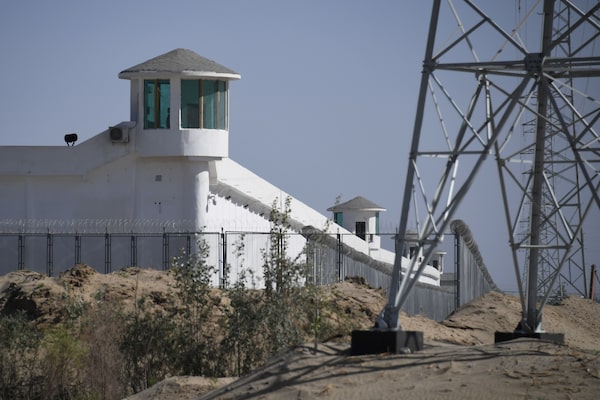
This photo taken on May 31, 2019 shows watchtowers on a high-security facility near what is believed to be a re-education camp where mostly Muslim ethnic minorities are detained, on the outskirts of Hotan, in China's northwestern Xinjiang region.GREG BAKER/AFP/Getty Images
The Canadian government is being urged to condemn forced-labour camps operating in China’s northwest Xinjiang region that critics say are producing items such as cotton and clothing for the world market.
A coalition of more than 180 advocacy groups and labour unions last week called on major global retailers to stop sourcing goods from Xinjiang, where China has faced widespread international criticism for locking up ethnic minorities. They’re asking major apparel brands to cut the Xinjiang region from their supply chains within 12 months.
Conservative labour critic John Williamson said it’s time for Canada to get involved. He is calling on Foreign Affairs Minister François-Philippe Champagne to launch an independent investigation into forced-labour camps operating in Xinjiang.
Mr. Williamson noted that the Trudeau government has long championed the principle of “fair trade,” in which producers receive sufficient compensation for their labour.
“Canadians expect their government to oppose forced labour, defend the rights of workers and principles of fair trade, and speak out against exploitative trade practices and cases of human slavery,” he said. “This practice in Xinjiang certainly violates that.”
Since 2017, Chinese authorities in the northwestern Xinjiang region have detained hundreds of thousands of predominantly Muslim people – most of them minority Uyghurs – in forced indoctrination camps as part of what Beijing calls a deradicalization campaign.
United Nations experts estimate that at least a million Uyghurs and other Muslims are held in detention centres in the region. China has denied mistreatment and said the camps offer vocational training.
The Coalition to End Forced Labour in the Uyghur Region, representing dozens of signatory groups, alleges that the supply chains of most major apparel brands and retailers are “tainted by Uyghur forced labour.”
“Roughly one in five cotton garments sold globally contains cotton and/or yarn from the Uyghur region,” the coalition said in a statement.
Concerns about coerced labour go beyond cotton and clothing. In March, a report issued by the Australian Strategic Policy Institute, a think tank, estimated that more than 80,000 Uyghurs were also transferred out of Xinjiang to work in factories across China between 2017 and 2019, and some of them were sent directly from detention camps. It said they are working in factories in the supply chains of at least 82 well-known global brands in the technology, clothing and automotive sectors.
China has denied any misconduct in the Xinjiang region. On Wednesday in Beijing, in response to France’s suggestion that a UN-led observation mission be undertaken to evaluate the treatment of the Uyghurs, Ministry of Foreign Affairs spokesman Wang Wenbin said “Xinjiang-related matters are not about human rights at all, but about combating violence, terrorism and separatism. The basic human rights of residents of all ethnic groups in Xinjiang are effectively guaranteed, and the people are living a safe and happy life.”
Uyghur-Canadian activist Mehmet Tohti, executive director of the Uyghur Rights Advocacy Project, said he believes it’s likely Canadians are buying goods made with Uyghur forced labour. “As long as it’s made in China and it’s a cotton product, there’s [a] 90-per-cent chance it’s from forced labour.”
A spokesman for Mr. Champagne said Canada “remains deeply disturbed by the troubling reports on the situation in Xinjiang.”
Adam Austen, deputy director of communications for the minister, said the government has “repeatedly voiced our concerns regarding the plight of the Uyghurs and other minorities in China, both in public and in private.” Canada also recently co-signed a declaration at the UN Human Rights Council along with 21 other countries.
“We continue to call on the Chinese government to abide by its international human-rights obligations and end the repression in Xinjiang,” he said.
“We will continue to use every opportunity and work alongside the international community to call on China to uphold its international human-rights obligations.”
Our Morning Update and Evening Update newsletters are written by Globe editors, giving you a concise summary of the day’s most important headlines. Sign up today.
 Steven Chase
Steven Chase